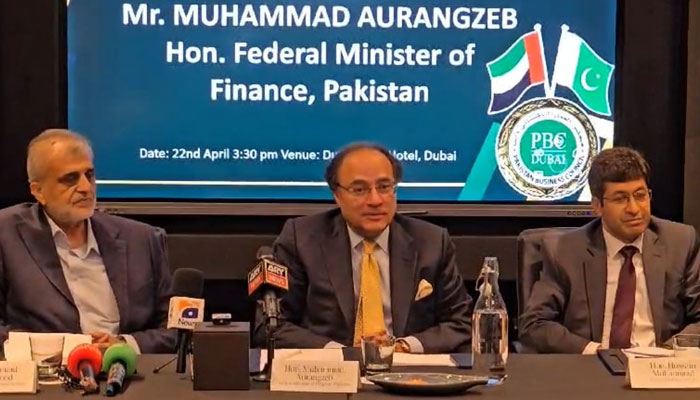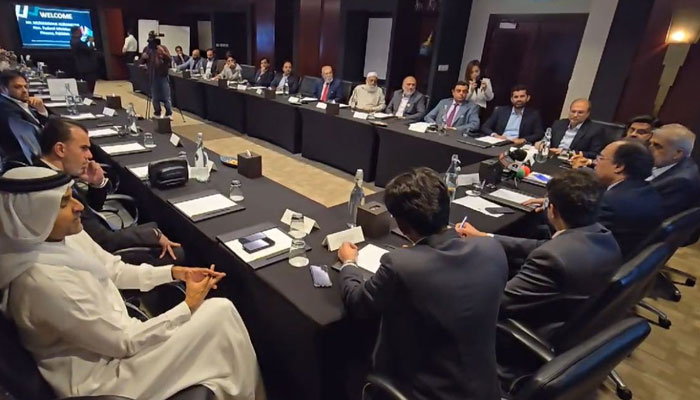Aurangzeb rules out tax amnesty
Finance Minister Aurangzeb said that now there will be no amnesty scheme and people will have to pay taxes
DUBAI: Finance Minister Muhammad Aurangzeb has said that now there will be no amnesty scheme and people will have to pay taxes.
Speaking at a ceremony in Dubai, he said that economic measures were not related to any government, but to the country. “Foreign exchange reserves will be $9 to 10 billion by June and the PIA will be privatised by July. Talks are ongoing with Turkey and Europe for the privatization of Islamabad airport while Lahore and Karachi airports will also be privatized,” he added.
Muhammad Aurangzeb said that Pakistan was currently not short of international funding. “We are trying to reduce the current account deficit and succeeded in it. The World Bank is ready to support for a “Digital Pakistan” for 10 years. Now there will be no amnesty scheme and people will have to pay taxes. We are making international payments successfully and the trust of international institutions has been restored in Pakistan and we are expecting trade finance from Emirati banks for a short period of time,” he maintained.
In an interview with UAE media, the finance czar said: “The IMF has been very receptive in terms of agreeing to consider a larger, longer programme.”
Aurangzeb told the Abu Dhabi-based publication that the macroeconomic factors were shifting in Pakistan’s favour as it was working to boost its lagging economy. “The rupee has finally stabilised,” he said, adding that inflation was on track to drop to single-digit levels by the end of the next year. He further said that the nation would need at least three years of support to carry out a reform agenda across several sectors including taxation and energy.
Pakistan has made a formal request to the IMF for another bailout package in the range of $6 to $8 billion under the Extended Fund Facility (EFF) with the possibility of augmentation through climate financing. However, the exact size and time-frame will only be determined after evolving consensus on the major contours of the next programme in May 2024.
On Monday, the minister held crucial meetings with leaders of commercial banks in the United Arab Emirates and members of the Emirati business community. Furthermore, he participated in a detailed session with the Pakistani business diaspora based in Dubai organized by the Pakistan Business Council, Dubai. He held discussions with key figures in the Pakistani business diaspora, including Iqbal Dawood, Shabbir Merchant, Mustafa Hemani, Asif Zaman, and others, to devise a plan of action for economic revitalization and investment in Pakistan.
He highlighted the facilitative role that short-term loans from Emirati commercial banks could play in achieving trade targets. He underscored the receptiveness of UAE authorities to Pakistan’s economic initiatives over the past nine months, which have contributed to strengthening the country’s economy. Expressing appreciation for the Emirati government’s eagerness to enhance economic ties with Pakistan, he revealed their readiness to further invest in the country. The minister emphasized the importance of transitioning from governmental economic frameworks to policy-based approaches for economic improvement and stability. He stressed the need for coherence in the government’s economic policies to facilitate betterment and solidity in the nation’s economic system. Earlier, during an extensive session with the Pakistan Business Council, Dubai leadership, the minister reiterated that Pakistan’s current economic initiatives were not tied to any particular government but inherently linked to Pakistan itself.
-
 Bridgerton’s Michelle Mao On Facing Backlash As Season Four Antagonist
Bridgerton’s Michelle Mao On Facing Backlash As Season Four Antagonist -
 King Charles Gets New ‘secret Weapon’ After Andrew Messes Up
King Charles Gets New ‘secret Weapon’ After Andrew Messes Up -
 Shia LaBeouf Makes Bold Claim About Homosexuals In First Interview After Mardi Gras Arrest
Shia LaBeouf Makes Bold Claim About Homosexuals In First Interview After Mardi Gras Arrest -
 Princess Beatrice, Eugenie ‘strained’ As They Are ‘not Turning Back’ On Andrew
Princess Beatrice, Eugenie ‘strained’ As They Are ‘not Turning Back’ On Andrew -
 Benny Blanco Addresses ‘dirty Feet’ Backlash After Podcast Moment Sparks Online Frenzy
Benny Blanco Addresses ‘dirty Feet’ Backlash After Podcast Moment Sparks Online Frenzy -
 Sarah Ferguson Unusual Trait That Confused Royal Expert
Sarah Ferguson Unusual Trait That Confused Royal Expert -
 Prince William, Kate Middleton Left Sarah Ferguson Feeling 'worthless'
Prince William, Kate Middleton Left Sarah Ferguson Feeling 'worthless' -
 Ben Affleck Focused On 'real Prize,' Stability After Jennifer Garner Speaks About Co Parenting Mechanics
Ben Affleck Focused On 'real Prize,' Stability After Jennifer Garner Speaks About Co Parenting Mechanics -
 Luke Grimes Reveals Hilarious Reason His Baby Can't Stop Laughing At Him
Luke Grimes Reveals Hilarious Reason His Baby Can't Stop Laughing At Him -
 Why Kate Middleton, Prince William Opt For ‘show Stopping Style’
Why Kate Middleton, Prince William Opt For ‘show Stopping Style’ -
 Here's Why Leonardo DiCaprio Will Not Attend This Year's 'Actors Award' Despite Major Nomination
Here's Why Leonardo DiCaprio Will Not Attend This Year's 'Actors Award' Despite Major Nomination -
 Ethan Hawke Reflects On Hollywood Success As Fifth Oscar Nomination Arrives
Ethan Hawke Reflects On Hollywood Success As Fifth Oscar Nomination Arrives -
 Tom Cruise Feeling Down In The Dumps Post A Series Of Failed Romances: Report
Tom Cruise Feeling Down In The Dumps Post A Series Of Failed Romances: Report -
 'The Pitt' Producer Reveals Why He Was Nervous For The New Ep Of Season Two
'The Pitt' Producer Reveals Why He Was Nervous For The New Ep Of Season Two -
 Maggie Gyllenhaal Gets Honest About Being Jealous Of Jake Gyllenhaal
Maggie Gyllenhaal Gets Honest About Being Jealous Of Jake Gyllenhaal -
 'Bridgerton' Star Luke Thompson Gets Honest About Season Five
'Bridgerton' Star Luke Thompson Gets Honest About Season Five





